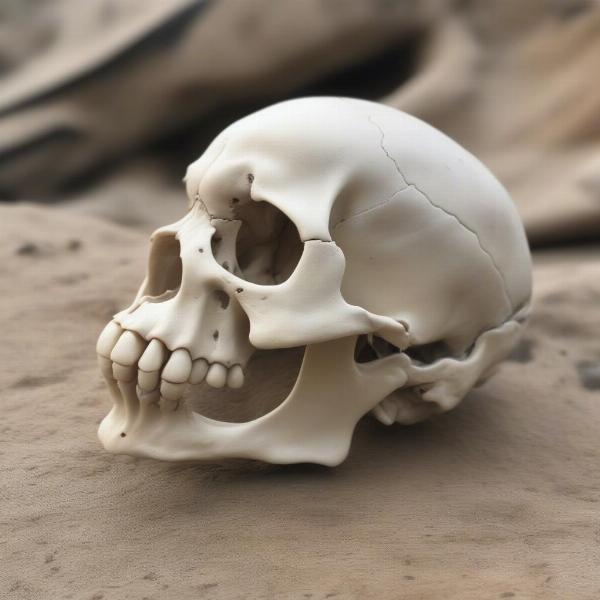Open fontanels in dogs, also known as moleras, are a naturally occurring soft spot on the top of a puppy’s skull. While most puppies’ fontanels close by the time they reach adolescence, some breeds retain this soft spot into adulthood. Understanding the significance of an open fontanel is crucial for responsible dog ownership. This article will explore the causes, potential risks, and necessary care associated with open fontanels in dogs.
Understanding the Canine Fontanel
 Open Fontanel on a Puppy Skull
Open Fontanel on a Puppy Skull
The fontanel is essentially an incomplete closure of the skull bones, leaving a gap covered by skin and muscle. This soft spot serves a vital purpose during birth, allowing the puppy’s skull to compress as it passes through the birth canal. Furthermore, it accommodates rapid brain growth during the early stages of life.
Breeds Predisposed to Open Fontanels
While all puppies are born with fontanels, some breeds are more prone to retaining them into adulthood. These typically include smaller breeds like Chihuahuas, Yorkshire Terriers, and Maltese. Larger breeds generally have fontanels that close completely within a few weeks to months.
Why Do Some Breeds Retain Open Fontanels?
Genetics plays a significant role in whether a dog retains an open fontanel. It’s believed that breeding for smaller head sizes may contribute to this characteristic. In some cases, open fontanels are associated with hydrocephalus, a condition characterized by excess fluid in the brain.
Potential Risks and Concerns
An open fontanel, especially in adult dogs, presents a vulnerability to head injuries. Even seemingly minor bumps or impacts can potentially cause trauma to the brain. Owners of dogs with open fontanels need to exercise extra caution and provide a safe environment for their pets.
Signs of Head Trauma
If your dog with an open fontanel experiences a head injury, watch for signs like seizures, lethargy, vomiting, or changes in behavior. Immediate veterinary attention is crucial in such cases.
Living with a Dog with an Open Fontanel
Owning a dog with an open fontanel requires a proactive approach to safety and care. Avoid rough play, especially with larger dogs. Use a skull dog harness or dog skull collar instead of a traditional collar to prevent pressure on the neck and head. Create a safe home environment by minimizing potential hazards. Regular veterinary check-ups are also essential to monitor the fontanel and address any potential complications.
Conclusion
An open fontanel in dogs, while often harmless, requires careful consideration and management. By understanding the risks and taking appropriate precautions, owners can ensure the safety and well-being of their dogs with this unique characteristic. Regular veterinary checkups are essential for monitoring the fontanel and addressing any potential concerns.
FAQ
-
What is an open fontanel in a dog? An open fontanel is a soft spot on the top of a dog’s skull where the bones haven’t fully closed.
-
Is it normal for a dog to have an open fontanel? It’s normal for puppies to have open fontanels, but they usually close as they grow. Some small breeds may retain them into adulthood.
-
What are the risks associated with an open fontanel? The primary risk is increased vulnerability to head injuries.
-
How can I protect my dog with an open fontanel? Avoid rough play, use a harness instead of a collar, and create a safe home environment.
-
When should I see a vet about my dog’s open fontanel? Consult a vet if you notice any swelling, changes in the fontanel, or signs of head trauma.
-
Can an open fontanel close later in life? While it’s less common, some dogs’ fontanels may close partially or completely later in life.
-
Are there any specific breeds prone to open fontanels? Small breeds like Chihuahuas and Yorkshire Terriers are more predisposed to retaining open fontanels.
ILM Dog is your trusted resource for all things canine. We offer expert advice on dog breeds, health, training, nutrition, grooming, and much more. Our mission is to provide dog owners worldwide with reliable and practical information to help them provide the best possible care for their furry companions. From choosing the right breed to navigating senior dog care, we’ve got you covered. For more information about open fontanels and other dog health concerns, visit our in-depth article on open fontanelle dog. Connect with us for personalized advice: Email: [email protected], Phone: +44 20-3965-8624. ILM Dog is dedicated to providing the best resources for your dog’s well-being, from puppyhood to senior years.